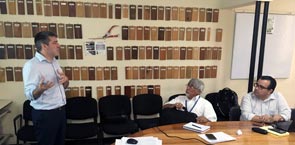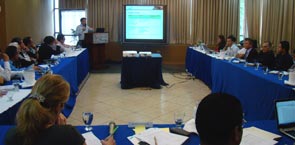Field Testing objective
The Field Testing of a draft Legality Definition and Verification Methodology is an important step in the negotiation process of a Voluntary Partnership Agreement (VPA). It is a joint exercise involving both parties (European Commission and VPA Partner Country). For the Honduras Field Test, Honduras was represented by the Field-test Working Group and the EU was represented by the European Forestry Institute (EFI).
In order to strengthen the expertise of the team engaged in the Field Testing, a Technical Assistant (TA) funded by EFI, with strong audit skills was hired to support the design, implementation and follow up of the Field Testing. EFI hired Preferred by Nature (formerly known as NEPCon) to conduct this role. More specifically, the objectives of the Field Testing included:
- Assessing the coherence between the TLAS evaluation criteria in Annex 7 and the content of all other annexes.
- Assess the applicability of the Legality Definition (LD) through desk-based evaluation and interviews with a representative sample of operators and government officials.
- Assess the applicability and credibility of the verification methodology proposed in Annexes 2 and 5, through desk based evaluation and interviews with a representative sample of operators and government officials.
- Assess the level of awareness/readiness of the government agencies involved in the implementation of the TLAS in terms of specific responsibilities for verification, including documentary and field verification and archiving for the elements of the TLAS that are under their responsibility.
- Make concrete recommendations to solve any issue that may arise during the Field Testing. This may imply a review of the LD and the Verification Methodology.
The general objective of the Technical Assistance (TA) to the Field Testing was to support the preparation, implementation and reporting of the Field Testing.

Tasks
The tasks of the Technical Assistance (TA) included:
Preparation phase (desk-based)
1.1 Carrying out a desk-based assessment of the coherence between the VPA Annex 7 (Criteria for the assessment of the TLAS) and all other VPA annexes to ensure that each criterion in Annex 7 corresponded to elements described elsewhere in the Agreement
1.2 Reviewing and finalising the Field Testing methodology
1.3 Developing checklists for each type of operator and administration/government agency identified in the LD
1.4 Developing all necessary Field Testing reporting templates
1.5 Preparing and participating in all preparation meetings with EFI and the Honduran working group (Skype, VC, etc.)
1.6 Providing comment which can contribute to improve the VPA Annexes 2,5 and 7 and the implementation of the Field Testing.
Implementation phase (Tegucigalpa (TGU) and in the field)
1.7 Preparing and participating in all implementation meetings with EFI and the Honduran working group
1.8 Adjusting Field Testing reporting templates based on feedback provided by the final preparation meeting in Honduras
1.9 Supporting the assessment of the level of awareness/readiness of the government agencies involved in the implementation of the TLAS in terms of specific responsibilities for verification including documentary and field verification and archiving for the elements of the TLAS that are under their responsibility.
1.10 Supporting the assessment of strengths and weaknesses of the LD (criteria, indicators, verifiers) and the verification methodology proposed in Annexes 2 and 5 through interviews with a representative sample of operators
1.11 Coordinating all reporting activities during the implementation phase, ensuring that all relevant information is captured.

Wrap-up and reporting phase
1.12 Preparing in TGU a short draft report with key findings of the Field Testing to be discussed with the Honduran working group and presented during an information session
1.13 Developing a full draft report presenting activities, findings identified under point 2.5 and recommendations to address any issue exposed during the Field Testing which may require adjustments to VPA annexes
1.14 Developing a full final report for both VPA negotiators based on feedback provided on the draft. Several iterations may be required to reach the approved final version of the report.
Methodology
The TA work schedule was divided in three phases:
- Preparation phase: The active preparation of the Field Testing took place remotely during the 6 weeks preceding its implementation. The TA worked in close collaboration with the EFI team and the Honduran working group, ensuring effective communication and timely delivery of expected outputs.
- Implementation phase: The actual implementation of the Field Testing in Honduras took place in-country over a period of about 23 days. The mission was extended by a few days to support report writing.
The first few days were dedicated to preliminary meetings and visits in Tegucigalpa to government agencies in charge of the emission and/or verification of LD verifiers where the Consultant, jointly with Honduras and EU parties, assessed the collection of information, verification and archiving of verifiers. This first phase also assessed the applicability and credibility of the verification methodology set out in the TLAS.
The remainder of the Field Testing consisted in visiting of a sample of sites and meeting operators of the forest sector outside of the capital, Tegucigalpa, representing the different types of permits or circumstances covered in the LD, where the TA, jointly with the Honduran working group and EFI, assessed their capacity to comply with the TLAS requirements.
Local representations of government agencies in charge of the emission and/or verification of LD verifiers were also visited to complete the information gathered during the first few days.
A final discussion and presentation of the initial findings took place during an information session to other stakeholders took place over a 2-day period after the return in Tegucigalpa of the Field Testing team.
Wrap-up and reporting phase: The TA prepared the material for the wrap-up session taking place in TGU with the Honduran working group and EFI. The findings of the Field Testing were presented in a way to facilitate decision-making on recommendations to be drafted for the VPA negotiators. Various drafts of the report were submitted in the final reporting process.

Commentary
The nature of the field testing in Honduras encompassed various elements, including: ground truthing, gap analysis and some elements of a forest governance assessment (looking at issues such as institutional capacities, cooperation, enforcement and effectiveness).
Many different individuals and entities were visited, including representatives from government, civil society organisations, indigenous peoples’ groups and the private sector travelled to different regions across the country. During the period of the field assessment, the views of approximately 200 stakeholders were gathered.
Deliverables
The assignment took place over a period from September to December 2016. Seven deliverables were delivered in the context of the assignment:
- a report on the desk-based assessment of the coherence between the VPA Annex 7 (Criteria for the assessment of the TLAS) and all other VPA annexes.
- an updated and commented version of the Field Testing methodology
- a set of checklists for each type of operator and administration/government agency identified in the LD
- a set of Field Testing reporting templates
- a set of presentation material for preparation meeting(s) with EFI and the Honduran working group in TGU
- a PowerPoint presentation and a short draft report with key findings of the Field Testing to be discussed with the Honduran working group and presented during an information session
- a full draft and final versions of the report taking into accounts feedback from a) EFI, b) the Honduran working group and c) the VPA negotiators.
Feel free to contact us if you wish to engage or learn more about this project.


